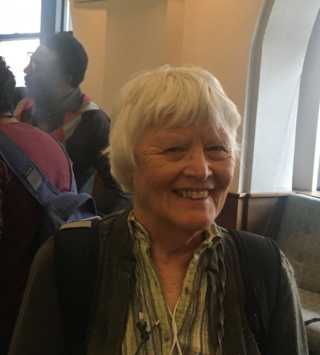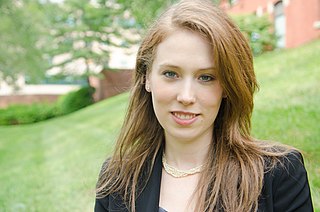Related Research Articles

Gertrude Mary Cox was an American statistician and founder of the department of Experimental Statistics at North Carolina State University. She was later appointed director of both the Institute of Statistics of the Consolidated University of North Carolina and the Statistics Research Division of North Carolina State University. Her most important and influential research dealt with experimental design; In 1950 she published the book Experimental Designs, on the subject with W. G. Cochran, which became the major reference work on the design of experiments for statisticians for years afterwards. In 1949 Cox became the first woman elected into the International Statistical Institute and in 1956 was President of the American Statistical Association.
Nan McKenzie Laird is the Harvey V. Fineberg Professor of Public Health, Emerita in Biostatistics at the Harvard T.H. Chan School of Public Health. She served as Chair of the Department from 1990 to 1999. She was the Henry Pickering Walcott Professor of Biostatistics from 1991 to 1999. Laird is a Fellow of the American Statistical Association, as well as the Institute of Mathematical Statistics. She is a member of the International Statistical Institute.
Xihong Lin is a Chinese–American statistician known for her contributions to mixed models, nonparametric and semiparametric regression, and statistical genetics and genomics. As of 2015, she is the Henry Pickering Walcott Professor and Chair of the Department of Biostatistics at Harvard T.H. Chan School of Public Health and Coordinating Director of the Program in Quantitative Genomics.
Louise Marie Ryan is an Australian biostatistician, a distinguished professor of statistics in the School of Mathematical Sciences at the University of Technology Sydney, president-elect of the International Biometric Society, and an editor-in-chief of the journal Statistics in Medicine. She is known for her work applying statistics to cancer and risk assessment in environmental health.
Rebecca A. Betensky is a professor of biostatistics and chair of the department of biostatistics at New York University's School of Global Public Health. Previously, she was a professor of biostatistics at the Harvard T.H. Chan School of Public Health, where she directed the biostatistics program for the Harvard Clinical and Translational Science Center. She was also a biostatistician for Massachusetts General Hospital, where she directed the biostatistics core of the Alzheimer’s Disease Research Center.
Janet D. Elashoff is a retired American statistician, formerly the director of biostatistics for Cedars-Sinai Medical Center and professor of biomathematics at UCLA.
Jane Worcester was a biostatistician and epidemiologist who became the second tenured female professor, after Martha May Eliot, and the first female chair of biostatistics in the Harvard School of Public Health.
Shelley Hurwitz is an American biostatistician. She is the Director of Biostatistics in the Center for Clinical Investigation at Brigham and Women's Hospital, and an associate professor in the Harvard Medical School.
Susmita Datta is an Indian biostatistician. She is a professor of biostatistics at the University of Florida, and is the former president of the Caucus for Women in Statistics. She is also a musician who has published three CDs of Bengali folk songs.
Motomi (Tomi) Mori is a Japanese biostatistician. Formerly the Walter & Clora Brownfield Professor of Cancer Biostatistics at the Knight Cancer Institute of Oregon Health & Science University (OHSU), she was named endowed professor and chair of biostatistics at St. Jude Children's Research Hospital in 2020. She is the chair of the Caucus for Women in Statistics for 2021.
Sharon-Lise Teresa Normand is a Canadian biostatistician whose research centers on the evaluation of the quality of care provided by physicians and hospitals, and on the health outcomes for medical devices and medical procedures. She is a professor in the Department of Health Care Policy at the Harvard Medical School and in the Department of Biostatistics at the Harvard T.H. Chan School of Public Health.

Nancy Flournoy is an American statistician. Her research in statistics concerns the design of experiments, and particularly the design of adaptive clinical trials; she is also known for her work on applications of statistics to bone marrow transplantation, and in particular on the graft-versus-tumor effect. She is Curators' Distinguished Professor Emeritus of Statistics at the University of Missouri.
Kathleen Rundle Lamborn is an American biostatistician, known for her highly-cited publications on glioma. She is an Adjunct Professor Emeritus of Neurological Surgery and former Director of the Cancer Center Biostatistics Core at the University of California, San Francisco, and Senior Scientific Consultant at Quintiles Pacific.
Carol Anne Gotway Crawford is an American mathematical statistician and from 2018 to 2020 served as Chief Statistician of the U.S. Government Accountability Office (GAO). She joined the GAO in May 2017. From August 2014 to April 2017, she was with the Department of Agriculture's National Agricultural Statistics Service. She was formerly at the National Center for Environmental Health of the Centers for Disease Control and Prevention. She also holds an adjunct faculty position at the Rollins School of Public Health of Emory University, and is an expert in biostatistics, spatial analysis, environmental statistics, and the statistics of public health. She also maintains an interest in geoscience and has held executive roles in the International Association for Mathematical Geosciences.
Amanda L. Golbeck is a statistician, social scientist, and academic leader. She is known for her book, Leadership and Women in Statistics, and her book on Elizabeth L. Scott, Equivalence: Elizabeth L. Scott at Berkeley. She is known for her pioneering definition of health numeracy.
Sue Geller is an American mathematician and a professor emerita of mathematics at the department of mathematics at Texas A&M University. She is noted for her research background in algebraic K-theory, as well as her interdisciplinary work in bioinformatics and biostatistics, among other disciplines.
Sandrine Dudoit is a professor of statistics and public health at the University of California, Berkeley. Her research applies statistics to microarray and genetic data; she is known as one of the founders of the open-source Bioconductor project for the development of bioinformatics software.

Sherri Rose is an American biostatistician. She is an associate professor of health care policy at Stanford University, and once worked at Harvard University. A fellow of the American Statistical Association, she has served as co-editor of Biostatistics since 2019 and Chair of the American Statistical Association’s Biometrics Section. Her research focuses on statistical machine learning for health care policy.
Rebecca Allana Hubbard is an American biostatistician whose research interests include observational studies and the use of electronic health record data in public health analysis and decision-making, accounting for the errors in this type of data. She is a professor of biostatistics in the Perelman School of Medicine at the University of Pennsylvania.
Melody S. Goodman is an American biostatistician whose interests include social determinants of health, health literacy, and stakeholder engagement in health research. Goodman has spoken publicly about racial disparities in access to healthcare, and is an advocate for public outreach and engagement on health issues. She is an associate professor of biostatistics and associate dean for research in the New York University School of Global Public Health.
References
- 1 2 "Julie Legler", Faculty and staff, St. Olaf College, retrieved 2017-11-20
- 1 2 3 4 Julie M. Legler, Macmillan Learning, retrieved 2017-11-20
- ↑ Cox Scholarship Recipients, American Statistical Association Committee on Women in Statistics, retrieved 2017-11-20
- ↑ Dissertations 1947–2018, Harvard Department of Biostatistics, retrieved 2017-11-20
- 1 2 Pope, Loren (2012), Colleges that Change Lives: 40 Schools that Will Change the Way You Think about Colleges, Penguin, p. 244, ISBN 9780143122302
- ↑ ASA Fellows list, American Statistical Association, archived from the original on 2019-11-21, retrieved 2017-11-20